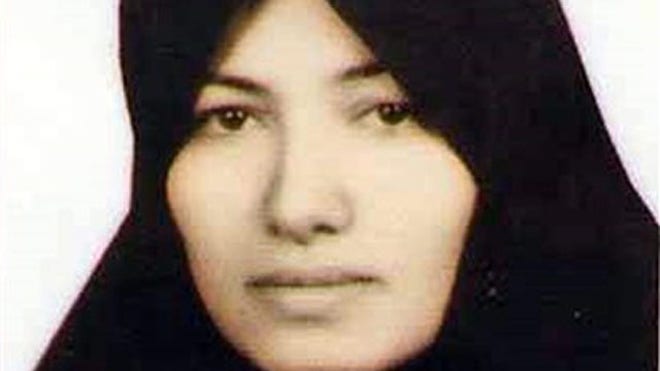Iran just doesn't want to leave the Stone Age.
The Islamic Republic's Sharia law-controlled judiciary dismissed the concerns of critics of its barbaric penal system and voted to retain stoning as the penalty for sex outside of marriage. The move was bad news for the estimated 10 women and men who human rights advocates say currently face death by stoning, as well as another 15 women Amnesty International says face the possibility of being pelted to death with rocks.
"The death by stoning provision not only contravenes international human rights standards and has no place in any penal code in any country, but also puts on full display the Iranian government's barbaric application of Islamic law which most negatively affects the rights of women and minorities in the country," Dwight Bashir, deputy director for policy at the U.S. Commission on International Religious Freedom, told FoxNews.com.
"The death by stoning provision not only contravenes international human rights standards and has no place in any penal code in any country."
- Dwight Bashir, U.S. Commission on International Religious Freedom
The rogue nation has rebuffed calls in the past for a more humane penal code. The case of Sakineh Mohammadi Ashtiani, 46, who was sentenced to death by stoning for an “illicit relationship outside of marriage,” erupted into an international scandal for Iran’s rulers in 2010. Iran’s regime now seeks to hang Ashtiani, who has already been exposed to a mock hanging, lashes and, according to the U.S. State Department’s 2012 report on human rights practices, beatings and cigarette burns.
Human rights groups including “Justice for Iran” have documented that Iran’s radical regime has stoned 77 people since the 1979 revolution ushered in a fundamentalist judicial system. Wahied Wahdat-Hagh, a European expert on Iran who has written extensively on the persecution of Christians, women, Baha’is and Jews in the Islamic Republic, told FoxNews.com that the number of victims stoned to death is believed to be higher than the frequently-cited statistics because of the lack of judicial transparency in the Islamic Republic.
The U.S. State Department’s human rights 2012 report noted that unconfirmed reports on the opposition Melli-Mazhabi Web site claimed that security personnel transferred the bodies of four women who had been stoned to the Tehran medical examiner’s office. The woman’s bodies showed evidence of torture, punishment by stoning and beatings, according to the Melli-Mazhabi website. Iranian officials rejected the reports but refused to provide answers for the deaths of the four women, who had been accused of engaging in “illegitimate relationships.”
“While the savagery of the regime is seemingly only directed at its own people, it should more broadly be seen as the manifestation of an expansionist ideology and an uncontainable brutality which is bound to affect the rest of the world community sooner or later,” Roya Hakakian, an American-Iranian expert on the Islamic Republic, told FoxNews.com.
Nasrin Amirsedghi, a leading Iranian dissident and intellectual in Germany who has written and lectured on the repression of women in Iran, told FoxNews.com that “Europe and the U.S. must make economic relations contingent on human rights improvements in Iran.” She said it was “illusionary “to think that mere dialogue with Iran’s leaders can influence an change in “this form of barbaric , inhumane and inacceptable laws [Stoning].” She called for economic sanctions targeting Iran’s regime because of its horrible human rights record.
Canada’s Parliament hosted “Iran Accountability Week” last week. The series of panels and committees outlined the Islamic Republic’s human rights violations, particularly the regime’s use of domestic and international terrorism to eradicate dissent and personal freedoms.
The Canadian Subcommittee on International Human Rights and the Foreign Affairs and International Development Committee unanimously adopted motions on Iran to cease using stoning and flogging as punishment and “desist from its persistent and pervasive assaults on the rights of women.”
Iran’s presidential election is slated for June 14 and has been marred by accusations of intimidating critical journalists and dissidents who oppose the regime’s heavy handed tactics. Iran’s fundamental clerical leaders refused to allow women to be candidates and limited the pool of presidential successors to candidates loyal to the Supreme Leader’s strict interpretation of Islamic law.
Benjamin Weinthal writes about human rights in the Middle East and is a fellow with the Foundation for the Defense of Democracies. Follow him on Twitter @BenWeinthal























